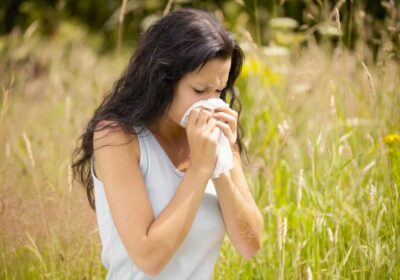What is hay fever, can babies and pets get it, can you take tablets while pregnant and what causes the allergic reaction?

IT’S an allergy that affects more than 13 million people in England and typically kicks in around the start of summer.
Around one in five of us will suffer from hay fever in our lives, but what exactly is it and what tablets can help prevent it? Here's all you need to know…
What is hay fever?
Hay fever is an allergic reaction to pollen, which can be released from a number of natural sources including trees or grass.
There is currently no cure for the condition, but many people are able to ease or control their symptoms with treatment.
You are typically more likely to get hay fever if it runs in your family, or if your family has a history of asthma or eczema.
Thankfully many people find their symptoms improve with age and can disappear completely in some cases.
What are the symptoms of hay fever?
People who have the common allergic condition usually experience one or more of the following symptoms:
- Itchy eyes
- A runny nose
- Sneezing
Treatment can include taking antihistamines to prevent an allergic reaction, or corticosteroids (steroids) to help reduce swelling and inflammation.
You can usually get over-the-counter medication from your pharmacist, but if symptoms are persistent, it could be worth speaking to your GP for a prescription.
How can you prevent hay fever?
Symptoms can be alleviated by wearing sunglasses outdoors to prevent pollen from getting in your eyes.
You should also shower after being outside to remove any pollen from your body, or try to avoid natural areas when the pollen count is high.
A high count will usually be over 50 grains per cubic metre of air.
Other tips include putting Vaseline around your nose to trap pollen and avoid hanging clothes out to dry.
And for those whose hayfever triggers asthma, there's an alluring way you can reduce your symptoms – by simply swapping your pint of beer for a gin and tonic.
For further tips on preventing hay fever, see the NHS website.
What are the causes of hay fever?
Hay fever is caused by an allergy to pollen, which is a powder released by plants that can cause eyes, sinuses, throat and nose to become irritated and swollen.
You may have an allergy to one or more of the following:
- Grass pollen – which is typically released during the end of spring and start of summer
- Tree pollen – released during spring
- Weed pollen – released late autumn
People who grow up on farms are less likely to suffer allergies in later life, a study last year suggested.
Can babies get hay fever?
You can get hay fever at any age, but it usually starts in childhood or when you are a teenager.
Research suggested that young Brits are twice as likely to suffer as over-55s – although where you live is also a key factor.
It is more common in boys rather than girls, however in adulthood it affects both sexes equally.
Can pets get hay fever?
It is not just humans who suffer from the increase in pollen: pets can have hay fever too.
It can be hard to determine if the symptoms are down to hay fever or discomfort in the hot weather, but there are signs to look out for.
These include:
- Inflamed or weeping eyes
- Unusual amounts of scratching
- Rubbing their head frequently against furniture
- If their personality becomes sluggish
If your pet has any of these changes, you should take them to the vet.
Can you take hay fever tablets when pregnant?
When you are pregnant you can take some hay fever medicines but are advised to steer clear of others.
It is best to get advice from your GP or pharmacist before taking any medicine when you are pregnant.
Often expecting mothers will be advised to take a nasal spray or eye drops before tablets.
Not all types of antihistamines are suitable during pregnancy, so it is important to consult your GP first.
According to the NHS website, Chlorphenamine is thought to be one of the safer antihistamines during pregnancy, but can cause drowsiness, so loratadine and cetirizine are typically preferred.
Olympic champ Laura Kenny admitted to the Sun Online that she has always noticed the seasonal sniffles, but her hay fever became more unbearable than ever when she became pregnant with her first child.
Source: Read Full Article





